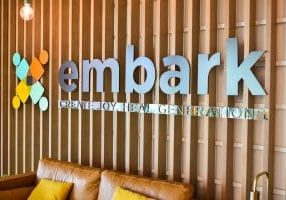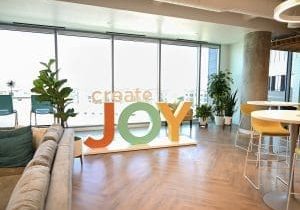Intensive Outpatient Programs (IOPs)
When your adolescent, teen, or young adult is struggling with a mental health or substance use issue but doesn’t require 24-hour care, Embark Behavioral Health intensive outpatient programs (IOPs) are here for you. Our insurance-reimbursed IOP treatment is ideal for young people who require more than basic outpatient services. It’s also an effective step-down option for those who’ve completed an inpatient residential treatment program.
We want to help you afford the best care possible for your adolescent, teen, or young adult, so our IOPs are insurance reimbursed, and we work with most insurance companies. Contact us, and we’ll walk you through a free insurance verification.
What Is an IOP?
An Embark IOP treats adolescents, teens, and young adults for mental health and substance use issues through outpatient services including family, group, and individual therapy. During IOP treatment for anxiety, depression, disordered eating, and other conditions, your child lives at home, surrounded by family and close to friends, and can maintain their work and school schedules.
In addition to our in-person IOP, we also offer Embark Virtual IOP. Available in several states, the virtual IOP connects youths and young adults with premium online mental health services and support through a secure patient portal.
Traditional Continuum of Care
Outpatient
Intensive Outpatient Programs
Partial Hospitalization Programs
Residential Treatment Centers
IOP details
-
Average length of treatment: six to 18 weeks.
-
Age range served: adolescents, teens, and young adults.
-
Treated: mental health and substance use issues.
-
Time of day: typically in the evening.
-
Weekly commitment: at least nine hours per week (three hours per day for three to six days a week).
IOP Benefits
Our IOP treatment for adolescents, teens, and young adults can meet your child’s needs in multiple ways. Here are some benefits of going to an intensive outpatient program at Embark:
- Offers a flexible schedule for adolescents, teens, and young adults.
- Allows young people to maintain their daily schedules.
- Allows youths and young adults to live at home while receiving treatment.
IOP vs. PHP
Like our intensive outpatient program, a partial hospitalization program, or PHP, helps adolescents, teens, and young adults heal from difficult mental health challenges like anxiety, depression, and disordered eating. With both options, your child lives at home and visits an outpatient center for therapy, including family sessions.
What’s the difference between a PHP and an IOP? If a youth or young adult needs more structure, treatment, and supervision during the day than what’s provided at an IOP but doesn’t need 24/7 treatment, a PHP can be a great option. Here are three key differences between the programs:
- IOPs typically meet in the evenings, while PHPs meeting during the daytime.
- IOPs meet for at least nine hours per week (three hours per day for three to six days a week), while PHPs meet for at least 25 hours per week (five to six hours per day for five days per week).
- The average length of treatment for an IOP is six to 18 weeks, compared to five to 10 weeks for a PHP.
Mental Health Treatment for Adolescents, Teens, and Young Adults
Each Embark intensive outpatient program for mental health is carefully designed to help your child heal from a variety of challenges so they can grow and thrive. We know that disorders come in all shapes and sizes, so our IOP treatment for adolescents, teens, and young adults can address multiple conditions.
Here’s what an Embark intensive outpatient program for mental health can treat:
Recent Blogs & Tips
Mental Health and Substance Use Experts
When your child needs IOP treatment for depression, anxiety, trauma, or another mental health or substance use issue, finding the right intensive outpatient program is important. At Embark Behavioral Health, you can feel confident your adolescent, teen, or young adult will receive care from some of the most reputable mental health experts in the country. Each IOP therapist is dedicated to helping young people heal and always leads with empathy and compassion.
Co-Occurring Substance Use Disorder Treatment
While it’s not uncommon for youths and young adults to experiment with drugs and alcohol, it’s nevertheless concerning. Substance use can turn into an addiction that changes the course of your child’s life. Getting your adolescent, teen, or young adult help when they need it, such as finding an IOP for substance use, is an imperative step toward recovery so your child can get on a path toward a bright and fulfilling future.
Embark IOPs can treat substance use and co-occurring substance use disorder — when your child has a substance use disorder in addition to a mental health condition — so long as the disorder does not require detoxification services for alcohol or drug withdrawal.

Our IOP Treatment
Here at Embark, we believe in a comprehensive path toward healing. Our IOPs treat adolescents, teens, and young adults using a combination of expertly led family, group, and individual therapy sessions. Our intensive outpatient therapy includes parent coaching to help ensure that your child’s results are sustainable.
Group therapy
During IOP treatment for adolescents, teens, and young adults, your child will participate in group therapy. They’ll find support from the therapist leading the session and their peers as they share and process their challenges, hear other people’s stories, and learn skills that will help them with distress tolerance, interpersonal effectiveness, and more.
Individual therapy
While in intensive outpatient treatment for mental health or substance use issues, your child will meet with a trusted therapist for individual therapy. In this setting, they’ll privately work through their thoughts, emotions, and difficult situations with the therapist.
Family therapy
True healing involves treating the entire family, which is why our IOPs include family therapy for every adolescent, teen, or young adult and their primary caregivers. By being fully engaged during the therapeutic process, you and your child will examine how you communicate and interact, then address any unhealthy patterns so you can establish healthier family roles and rules.
Parent coaching
During intensive outpatient treatment, a therapist will educate you about the mental health challenges affecting your child and family, help you with emotional processing, and offer parent-centered strategies for improving family relationships.
Healing therapies
We know that treatment is not one-size-fits-all, which is why Embark IOPs offer an array of healing therapies that will meet the individual needs of your child.

Dialectical behavior therapy (DBT):
DBT is a type of cognitive behavioral therapy that’s also known as “talk therapy.” Participating in DBT in an IOP can help your child overcome negative thinking patterns and implement positive behavioral changes.

Trauma-focused cognitive behavioral therapy (TF-CBT):
TF-CBT treats behavioral and emotional issues related to traumatic experiences. Participating in cognitive behavioral therapy in an IOP can help your child resolve the lingering effects of trauma.

Experiential therapy:
Experiential therapy is a hands-on approach to healing that includes experiential practices such as art therapy, adventure/outdoor therapy, and animal-assisted therapy. Used as part of our intensive outpatient treatment, this therapeutic approach can help your child heal by engaging their physical, emotional, and relational aspects.
IOP Treatment Locations for Adolescents, Teens, and Young Adults
IOP FAQ
How long is IOP treatment for adolescents, teens, and young adults? An Embark IOP requires a minimum commitment of nine hours per week (three hours a day, three to six days per week).
How long is IOP treatment for adolescents, teens, and young adults? An Embark IOP requires a minimum commitment of nine hours per week (three hours a day, three to six days per week).
Inpatient and outpatient treatment programs can both help adolescents, teens, and young adults heal from challenges like anxiety, depression, and disordered eating. So, how does IOP vs. inpatient treatment differ? In an inpatient treatment program, your child will live at a treatment facility and receive therapy while there. In an intensive outpatient program, they’ll live at home and visit an outpatient center for care.
How does an IOP work? Intensive outpatient treatment allows your child to take part in a comprehensive healing experience while also maintaining their school and work schedules and living at home, surrounded by family and close to friends. At Embark Behavioral Health, our IOP offers family, group, and individual therapy as well as parent coaching.
Interested in Learning More About Intensive Outpatient Programs for Teens?
The best way to determine which type of therapy or treatment is right for your teenager, is to speak with our mental health team.
Our mental health professionals will consider your child's symptoms and treatment history, as well as outline what you and your family want out of therapy to recommend the best next steps specific to your situation.
If you think one of Embark's intensive outpatient programs may be right for your daughter or son, contact us to learn more today.











